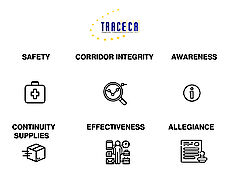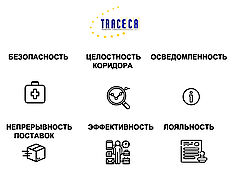Recommendations of the Permanent Secretariat of the Intergovernmental Commission TRACECA to ensure transport of goods under the restrictions adopted in the Corridor countries
Border control measures adopted in the TRACECA countries are indicative in varying degrees of the possibility to perform goods transport along the whole length of the Corridor
Taking into consideration the current situation in the world with regard to the pandemics of coronavirus (COVID-19), and within the framework of the implementation of the Strategy of the Intergovernmental Commission TRACECA for development of the international transport corridor Europe-the Caucasus-Asia for 2016-2026, ensuring the sustainable multimodal network, that favours smooth and unhindered movement of goods, is the priority principle that should guide our work, utilizing the full transit potential of the corridor.
To ensure safe and smooth movement of goods between the TRACECA countries the Permanent Secretariat set out the principles of an integrated approach to the effective management on the border based on the measures implemented in the member states.
1. Transport hubs (ports, airports, logistics centres, border crossing points, etc.) must be strengthened considering the WHO Recommendations for ensuring safe transport of goods through the border
Appropriate measures need to be taken for people who are identified as posing a risk to public health from Covid-19. They should have access to appropriate health care, regarding the prioritisation of different case profiles in national healthcare systems.
Based on best practices in TRACECA countries, it is recommended to take the following steps, as appropriate:
- Put in place entry screening measures which aim at assessing the presence of symptoms and/or the exposure to Covid-19 of travelers crossing the border;
- Provide the verification of the stay during the last 30 days in the countries wherein the spread of the virus was recorded;
- Provide information materials on the coronavirus (leaflets, banners, posters, electronic slides, etc.) for distribution to travelers arriving to the country and increasing the awareness level;
- Detection of suspicious cases should be documented based on the results of test results with subsequent quarantine for a period of 14 days;
- In case of a vehicle crossing the border from the country with detected virus spread, disinfection of a vehicle needs to be organized as the example of Azerbaijan and Georgia demonstrates.
2. Member states are not recommended to take measures that jeopardize the integrity of the route to transport goods
Member states should take measures aimed at the entry of their citizens and residents and facilitate the transit of other TRACECA countries’ citizens moving to the country of residence.
Consequently, coordination at the intergovernmental level is a key factor in developing measures with regard to the borders management. Collective and coordinated actions play a significant role along the whole length of the Corridor.
In the event that a member state introduced the transport-related restrictions with regard to carriage of goods and passengers it is rational to envisage that these restrictions be as follows:
- transparent and adopted by the relevant decision of the competent authority of the country;
- properly motivated and related to Covid-19. The justifications must be science-based and supported by the World Health Organization (WHO);
- non-discriminatory.
3. Any planned transport-related restrictions should be notified to the Permanent Secretariat and to all TRACECA member states, in respect of which the restrictions are implemented.
The notifications should be done in a timely manner, i.e. before these restrictions come into force, without prejudice to the carriers of the border countries.
4. Control measures are proposed to preserve the continuity of economic activity and supply chains.
Unobstructed transport of goods is crucial to maintain availability of goods, in particular of essential goods such as food supplies (It should be taken into account in the transport of food supplies that according to the European Food Safety Agency there are no evidence that these are a source of a source of transmission of Covid-19), vital medical and protective equipment and supplies.
In that context, the facilitation of safe movement for transport workers, including truck and train drivers, pilots and aircrew, crossing the state borders, is a key factor to ensure adequate movement of goods.
5. Member states of the Corridor should effectively organize the activity of state authorities in order to avoid overlaps of effort and reducing waiting time.
It is essential to coordinate efforts in carrying out health screening between the border countries. Screening arrangement on one side of the border is the most effective and makes it possible to avoid overlaps of countries’ efforts as well as to reduce the waiting time of carriers.
Member states have the possibility to refuse entry to the country if there are coronavirus symptoms or there is a risk of infection for public health. At the same time it is recommended to take measures alternative to the refusal for entry such as isolation or quarantine in case they are considered more effective subject to the current situation.
Considering wide spread of 14-days quarantine in the TRACECA countries it is rational to envisage the relevant conditions at border crossing points. It is recommended not to refuse for entry to the persons where they present relevant symptoms. They should have the corresponding medical aid.
With the view of reducing the risk of the virus spread it is important to arrange the border control in such a way in order not to allow congestions on the border, including the congestions of vehicles before entering the country.
6. The competent state authorities of TRACECA countries are invited to consider for a specified period the possibility of temporary lowering the requirements to transport workers
The experience of Bulgaria and Romania shows that the requirements to transport workers, specifically to drivers of freight vehicles may be lowered with regard to observance of the driving and rest times.
Measures being analogous to the increase of the maximum daily driving limit from 9 to 11 hours and decrease of the regular weekly rest period from 45 to 24 hours, may be adopted in all TRACECA countries, justified by the increased border control time (taking into account the time for screening, documents check, sanitary procedures, waiting on the border, period of quarantine, etc.).
Temporary lowering of the requirements to transport workers in the event that they travel to the country of residence is especially important.
The member states of the Corridor are invited to show understanding with regard to:
- minor violations of driving and rest periods for drivers of freight vehicles;
- possibility of extension of the permissive documents’ validity, including transportation permits (entry/exit to/from the country, transit through the country);
- violations related to the current situation in the world as well as to the applied sanctions.
Country:
Mode:
Published:
Permanent Secretaritat of the IGC TRACECA







